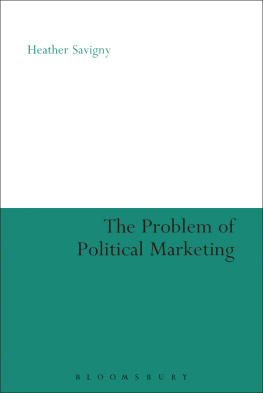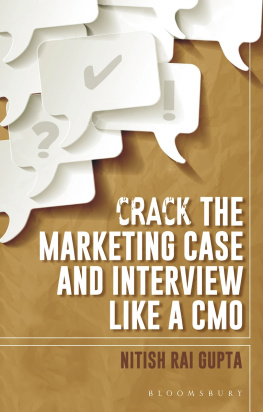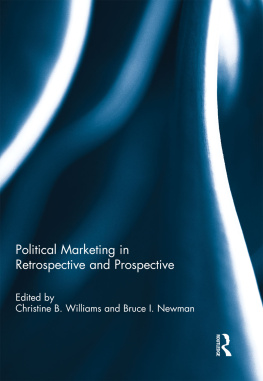Acknowledgments
This has not been an easy book to write. There are many people to whom I am indebted, both friends and colleagues who, throughout, have encouraged and supported me, kept me sane, made me laugh, and provided inspiration. These people include: Catherine Ball, Stephen Bates, Andy Bugg, Denise and Michael Carter, Will Duff, Paul Fisher, Luke Garrod, Peter Handley, Jane and Mark Hewitt, Michael Higgins, David Hudson, Gina Irving, Mikko Kuisma, Tim and Dot Lenton, Michael Lister, Simon and Rachel Lunness, Lee Marsden, Gina Neff, Sol Nte, Lucy ODriscoll, Chris Pike, Becky Salmon, Simon Taylor, and Chris Wilson. And those who have gone above and beyond by providing comments and critical feedback (often in a very short space of time!) on earlier versions of this work including: Tim Dant, Steve Davies, Colin Hay, Thea Hinde, Steve Kettell, Darren Lilleker, Dave Marsh, Matt Olczack, Nicola Pratt, Jean Savigny, Richard Scullion, John Street, Mick Temple, and Dominic Wring. Also, remembered here, and sadly missed, are Jane Ardley and Heather Coles.
Id like to thank David Barker, Max Novick, and all at Continuum who have been brilliant.
However, none of this would have been possible without the very much appreciated support of my family, my late dad, my mum, and my sister, Hazel. But most of all, thank you to Sam, for being the best son a parent could wish for.
Introduction
There is a problem, a perception of crisis in politics. As Western electorates display increasing cynicism towards, their political elites and are less inclined to vote, there has been widespread concern about the character of contemporary democracy and suggestions of its decline. Discerning these tendencies, some scholars have focused attention upon the role of formal politics in the hollowing out of citizenship In the practical world of politics, in a bid to reinvigorate the public, politicians are using all manner of available technologies and methods, from text messaging to blogging; also under consideration are electronic townhalls, citizen juries, Sunday voting and ballot boxes in supermarkets. Underlying all this, however, has been a profound shift in the way politics is both conceived of and practised. Politics, as both elite-level activity and the dissemination of this to the public, has predominantly become a process of marketing. The central argument of this book is mat this use of marketing has played a key role in contributing to the existence of a political malaise as marketing both subverts the democratic process and disconnects the public from politics.
Background
Political marketing in itself is not particularly new. As a practice and set of strategies originating in America,
Permanent political marketing?
There is also a sense that political marketing is not just confined to election campaigns, rather it has become a means of governance. Marketing methods have shaped the formulation and implementation of policy in office, leaving many commentators to link the use of marketing with the notion of a permanent campaign.
In response to this, within the political marketing literature, advocates argue that marketing strategies should be part of not only the formal electioneering period but also should become embedded as part of the governing process. Newman described and positively advocated these techniques during the Clinton era, stating that the same marketing tools mat were used to get Clinton into the White House could also be used to govern. Not only does the political marketing literature describe campaign practice, but it is now also regarded as means of governance. It is viewed as necessary so that the candidate/party can remain responsive to the voters, while governingenabling them to achieve the longer term goal of reelection.
This responsiveness to the public is also used as the basis for the normative defence of marketing in politics: that marketing is a good thing for politics. Scholars within political science and management marketing literature claim both its benefits and advantages. In this way, political marketing has been presented as a panacea to cure the ills of democracy.
State of the debate
While it has become broadly accepted that the activity of politics is increasingly informed by insights from marketing, the academic literature in political marketing is not homogenous. Contributions to the literature have been made from scholars in management, communications and political science. However, it is the theories and models from managerialist marketing which inform the dominant literature in this field. These are used to coherently describe the practice of political elites in contemporary electioneering. At the same time, these models are also used to make a series of predictive, prescriptive and normative claims, and it is these claims which form the basis of the critique presented here.
The more critical literature Building on these accounts, the contention here is that marketing has become more than a set of descriptive models or a set of electioneering strategies. In transposing these managerial models into the political arena, marketing has, problematically, become the content of politics. At the core of this book lies the question, does political marketing subvert democracy and the political process? The answer, in its present form, is yes. Marketing has subsumed politics. While marketing may be an inevitable feature of the contemporary electioneering environment, this is not without its problems.
Aim of book
The purpose of this book is critique, but the intent is not nihilism. It is acknowledged that in the contemporary environment, political marketing forms a central part of political parties or candidates strategy. The main critique presented here is not in the use of marketing per se, but that marketing strategies have become dominant above all else. This is problematic, as will be shown, since many of the normative ideas within managerial marketing are essentially antidemocratic. It is contended here that what should be driving political marketing is a commitment to politics: a marketing that includes politics. It is also suggested that marketers through advocating the marketing process, and political actors in practice, have become complicit in the process of malaise, as marketing leaves little room for political content. That is, marketing reshapes the processes of politics, but in so doing downplays, indeed removes, the need for political content.
At the foundation of politics are distinctive sets of values and a vision of how society should be run, which are embodied in political ideology. In turn, these are articulated differently depending upon the ideological position of the candidate or party. For the party/candidate their raision detre is the achievement of office to implement politics which reflect this societal vision. For the public, political parties/candidates function to represent and protect their interests. The primary motivation of a business organisation is to make a profit This tension between the principal objectives of businesses, political parties and the interests of the public forms the basis of the argument here. As such, the aim is to provide a critique of both the workings of the contemporary process and the marketing literature which seeks to inform and influence politics.











![Heather Fitzpatrick [Heather Fitzpatrick] - Marketing Management For Non-Marketing Managers](/uploads/posts/book/124049/thumbs/heather-fitzpatrick-heather-fitzpatrick.jpg)

